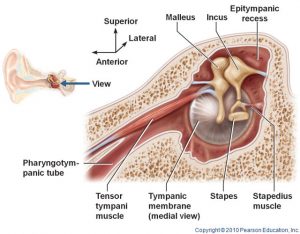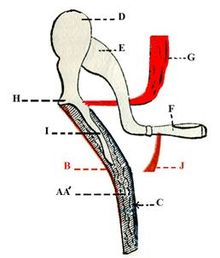
The abnormal activity of the tensor tympani muscle of the middle ear is known as a tonic tensor tympani syndrome. With a combination of the stapedius muscle, the tensor tympani muscle provides you function like Speaking, Chewing, and it also protects your ears from damaging sounds level.
You can purchase the latest hearing aids at a fair price through HearingSol, If you need any assistance or you have a query regarding Tonic Tensor Tympani Syndrome or Hearing Loss, feel free to call us at +91-9327901950. We are always here to help you.
Here in this article, we are going to discuss Tonic Tensor Tympani Syndrome Causes, Symptoms, Treatment, Impact, FAQs, and all related facts.
What Is Tonic Tensor Tympani Syndrome?
Tonic tensor tympani syndrome is an abbreviation of TTTS, this is a disease of tensor tympani muscle. It is a condition related to anxiety that can drastically affect a person’s ability to hear.
It is considered to cause the distinctive symptoms of acoustic shock (AS), which can develop after exposure to an unexpected loud sound perceived as highly threatening.

It is an anxiety-based, involuntary condition, in this condition the tensor tympani muscle activity is reduced, which causes a frequent spasm.
This condition can trigger aural symptoms from tympanic membrane tension, trigeminal nerve irritability, and the middle ear ventilation alteration.
TTTS also causes the Distinctive symptoms of Acoustic shock, which develops after the exposure to an unexpected loud sound.
Aural pain and the blockage without underlying the pathology has been noted in the people who suffer from tinnitus or the hyperacusis.
Some statistics saying that it occurs in only 1 out of every 100,000 people. The tensor tympani muscle, from which TTTS gets its name, is one of the two tiny muscles in your middle ears and the other is the stapedius muscle.
The word “tonic” in this syndrome name describes the pulsing action of the tensor tympani muscle.
Tensor Tympani Muscle

This is a muscle in the ear, which is located above the osseous portion of the auditory tube in the body canal. This tube is helpful to dampen the loud sound.
The reaction time of this muscle is not fast enough, that’s the reason that the muscles cannot protect against the hearing damage caused by sudden and loud explosions or the sound produced from the gunshots.
Impact Of Tonic Tensor Tympani Syndrome
Tensor tympani muscle protecting the inner ear from loud sounds. The middle ear, located between the eardrum and the inner ear. It has three tiny bones known as the ossicles.
The job of the tensor tympani muscle is to pull the tiny malleus (hammer) bone away from the eardrum (tympani), thus tensing the eardrum. Tensor tympani Syndrome is involuntary.
When the muscles contract in response to the potentially damaging sound, the tiny bones of the middle ear (ossicles or tinny bone) move to tighten the eardrum.
Whenever sound enter the ear the ossicles vibrate and sound increase, the more these bones will vibrate. It’s one major function of the Tensor Tympani Muscle.
It also contracts to reduce the volume of sounds produced when you chew your food. This muscle reacts sudden loud sounds, it’s called the startle reflex.
If any person suffers from hyperacusis and misophonia increased activity develops in the tensor tympani muscle as a part of the startle response to some sounds, this is called Tonic Tensor Tympani Syndrome.
- Hyperacusis is the condition of hearing noises abnormally loudly
- Another name of Misophonia is haters of sound
- Tinnitus is simply mean ringing of sound
Symptoms of Tonic Tensor Tympani Syndrome
- Nausea
- Dizziness or Unsteadiness
- A sensation of pressure in the ear
- A headache
- Feeling of fullness
- Impaired hearing
- Tinnitus
- Muffled or fluctuating hearing
- Disordered or Vertigo
- Sharp pain
Causes of Tonic Tensor Tympani Syndrome
TTTS is associated with anxiety, specifically, the anxiety related to tinnitus and hyperacusis and it is a psychosomatic condition.
People who are suffering from, misophonia, phonophobia, tinnitus, or hyperacusis are at higher risk for developing TTTS. When someone experiences decreased sound tolerance, the everyday sound seems to be loud.
The exposure to triggering sound, increase in tinnitus or hyperacusis may occur, as well as the increased anxiety. The increase in anxiety in response to sound can lead to increased activity of the tensor tympani muscle.
Some people who suffer from severe hyperacusis or misophonia, they don’t need to hear a sound in order for their tensor tympani muscle to contract.
The muscle activated by itself by making the perception or anticipation of loud sound and can contract just by thinking about a specific or loud sound.
Some evidence is also there which indicates that TTTS can also be the result of TMJ problems or the upper cervical spine problems caused by whiplash.
Tensor Tympani Syndrome Treatment
It is quite difficult to diagnose the TTTS because very there are very few people who heard about it. Even the physicians don’t know much more about the TTTS.
Analyzing or treatment for Tensor Tympani Syndrome often involves the use of sound therapy to treat tinnitus or hyperacusis. Sound therapy overcomes the effect of loud noise.
Some forms of sound therapy, Distraction(this is the process of diverting the attention of an individual), Habituation(helping a person to learn to ignore the ringing). The hyperacusis and tinnitus become under control, the Tonic Tensor Tympani Syndrome is likely to resolve.
The treatments which work for the TTTS problems are as follows:-
1. Sound Therapy
Many people get the tensor tympani syndrome from acoustic trauma. One of the most successful treatments of TTTS is sound Therapy.
Sound Therapy is the form of a habituation therapy designed to help people who suffer from tinnitus or the hyperacusis which is caused by acoustic trauma.
The sound therapy method requires patience and extreme self-discipline. This method takes about 6-12 months on average for the complete treatment. This method is one of the best treatment options for both tinnitus and hyperacusis.
Sound therapy is done by the audiologist, while many audiologists do not provide this treatment. One can also use this method from home, the sound generator for sound therapy is available online, from where you can order and an online audiologist will guide you with the treatment process.
2. Tonic Tensor Treatment Syndrome Magnesium
Low levels of magnesium can cause people to suffer from the problem of anxiety disorder, which is one of the major causes of tonic tensor treatment syndrome.
Many people with tensor tympani syndrome had an anxiety disorder. High-quality magnesium supplements reduce stress and also improves sleep.
One of the main reasons for losing magnesium from the body is a loud sound. Especially when exposed to the loud sound for a long period of time.
According to a study in February 2001 in the “Occupational Medicine” journal which concluded that exposing people to the loud sound regularly causes their body to lose the magnesium. One of the best form of magnesium to take for his problem is Magnesium Citrate.
3. TMJ Treatment
TMJ can produce the Continuous spasm of the tensor tympani muscle along with ear pain, tinnitus, and the other symptoms.
The muscles which we use to chew are near to some of the muscles that lead into the middle ear, which may cause hearing problems that lead to tensor tympani syndrome and tinnitus.
If the muscles in the jaw become tight with the tension, then the ear becomes sensitive. It is best to consult the doctor, chiropractor, or dentist to find out if you have TMJ.
Massaging the jaw, neck, and cold packs, gentle stretches of the neck, stress reduction, and avoiding chewing gum are some of the home treatments of TMJ.
4. Natural Remedy
- Ginkgo Biloba and Vinpocetine herbs that help to increase the blood flow in the inner ear, which relax the tensor tympani muscle. It’s a good remedy for this syndrome.
- One of the best ways to fix problems with nerves are B vitamins(B-complex vitamin) B-complex is a vegetable capsule.
TTTS does not harm the ear, but it can be uncomfortable and painful to experience for an extended time period. It can cause high levels of anxiety if left untreated.
Tonic Tensor Tympani Syndrome Surgery
In this surgery, an ear surgeon cuts the tensor tympani muscle to relieve the spasms. For some people this surgery is helpful, but mostly it makes the hyperacusis worse.
As the surgeon cuts the tensor tympani muscles, you have less protection from the loud sound, which in result causes the sound sensitivity to be worse.
Due to the noise trauma, these muscles become over-protective because of which reacts abnormally, that’s why many believe that cutting the muscles will solve the problem but, simply cutting the muscles will not solve the root problem. While the root problem is the inner ear damage which causes the sound.
The surgery will stop the spasms, but many people refuse this surgery because it makes their hyperacusis worse. And many people also report that it makes their tinnitus worse. Apart from this, some people have great success with this surgery.
This surgery will potentially work for you if your TTTS is not caused by the noise trauma, but it is also important to note that you may get hearing damage without the tensor tympani muscles to protect the ear.
This is because the tensor tympani muscle is a protective reflex, similar to the blink reflex.
What Is Hyperacusis?
Hyperacusis is a debilitating hearing disorder characterized by an increased sensitivity to certain frequencies and the ranges of the volume of the sound.
The person with the severe Hyperacusis has difficulty in tolerating everyday sounds, some of which may seem unpleasantly or painfully loud to that person but not to the others.
Hyperclausis is often coincident with tinnitus, while both the conditions have a prevalence of about 10-15% and cause Hearing Loss as the major risk factor. It is a condition that affects how you perceive sound.
You may listen to a high-level sound which is not a problem for others. This means loud noises, such as fireworks, and every day sounds like telephones can feel uncomfortable and sometimes painful.
Symptoms of Hyperacusis
- Sudden discomfort when hearing particular sounds.
- Some cases seem as though all sounds are just too loud.
- It can sometimes be coupled with phonophobia, fear of noise.
- You begin to associate the noise with pain.
- Anxiety and depression
- It can be experienced if you suffer from tinnitus as well.
Prevention for Hyperacusis
There are several steps you can take to ensure you protect your hearing. These include:
- Try listening to music at a reduced volume for shorter periods of time
- Wearing ear protection – for example at concerts, or at work if necessary
- Being aware that extended exposure to sounds above 85 decibels can damage your hearing.
Frequently Asked Questions (FAQ) of Tensor Tympani Syndrome
1. Is Tensor Tympani Syndrome Connected To Jaw Joints Dysfunction?
TTTS can be a result of TMJ problems. TMJ can produce a brief spasm of the tensor tympani muscle. If the muscle in your jaw tight and tense, it can result in your ear.
2. Does Tonic Tensor Tympani Syndrome Cause Lasting Problems?
The tonic tensor tympanic syndrome does not harm the ear by itself. But, for a longer period of time, it will be painful and uncomfortable for a person.
High levels of anxiety can occur due to tensor tonic tympanic syndrome if it is left unmanaged or unnoticed.
So, therefore to reduce the risk of the tensor tonic tympanic syndrome I will suggest you go for the treatment of tinnitus, hyperacusis and, misophonia.
3. Do I have Tonic Tensor Tympani Syndrome (TTTS)?
Most of people are not familiar with this condition. These are one of the two tiny muscles in your middle ears and the other one is stapedius muscle. The tensor tympani muscles react to sudden loud sounds this is known as the startle reflex.
This condition can be worse if you are particularly stressed or anxious. These muscles pull the tiny malleus bone away from the eardrum. It can reduce the volume of sound which is transmitted into the inner ear.
Tensor tympani muscles perform other function also as it helps in protecting the delicate inner ear structures from noise damage. It also reduces the volume of the sound when you chew your food.
When everything is working properly and you are not aware that two muscles are working for you. But when their function stop you may become painfully aware of their existence.
Interesting Facts Related To Tonic Tensor Tympani Syndrome
- The person having tinnitus, hyperacusis, or misophonia are more likely to suffer from TTTS.
- The symptoms of the TTTS increases with the severity of tinnitus or hyperacusis. The person who has more severe tinnitus/hyperacusis/misophonia have to face the worst condition of the TTTs
- Believing that certain loud sounds have damaged your ears(but they are not) you are setting yourself to develop TTTS symptoms in yourself. So, take it easy and try to habituate to your tinnitus or hyperacusis.
- The therapy for tinnitus and hyperacusis can reduce the severity of the tensor tonic tympanic syndrome.
So, it is important to seek treatment for tinnitus, hyperacusis, and misophonia to reduce the risk of TTTS. For any query or issue just give us a call on +91-9327901950 or you can visit HearingSol Clinic in Delhi NCR. We are always glad to help you.

 Reviewed by Mr. Ranjeet Kumar
Sr. Audiologist, Speech Therapist & Cochlear Implant Specialist, BASLP on
Reviewed by Mr. Ranjeet Kumar
Sr. Audiologist, Speech Therapist & Cochlear Implant Specialist, BASLP on